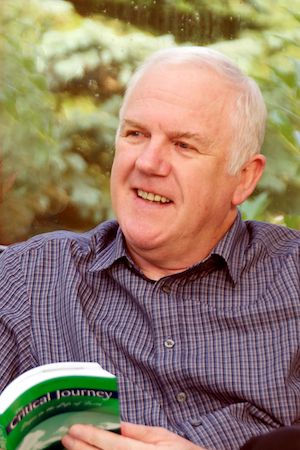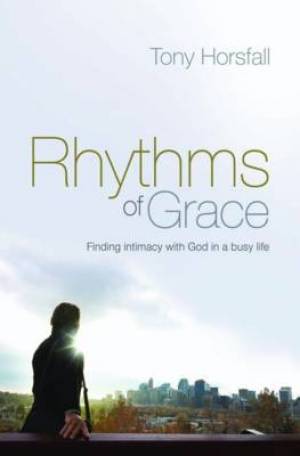How to work from a place of rest
Atanas Kolev
Tony Horsefall discovered what he calls the "contemplative strand" of Christianity after witnessing many Christian leaders burn out. His experience of solitude and silence revolutionalised Tony's life and ministry. The author of six books has now dedicated ten years of his life to teaching principles such as working from a place of rest all over the world.

1. How did you first discover contemplative spirituality?
I went into a training ministry at Bawtry Hall in the North of England and it was during that time that I began to notice how many Christian workers experienced burn out and was aware that I myself lived on the edge of exhaustion doing so many things.
I began to look for a better way to live and discovered what you might call the contemplative strand, the kind of approach to God which is built around stillness and silence and intimacy. It had a big impact on me personally and I felt this is what I wanted to teach to people from then on. I’ve been doing that since the year 2000.
2. Why do so many Christians find it hard to slow down?
There’s lots of reasons for it. One is because the work is never done. You can never say ‘that’s finished’. There’s always more to do in Christian ministry.
Secondly we can have our own motivations inside us and we can be driven to be successful and find our identity in what we do. The very title of The Purpose Driven Life puts you in that frame of mind that you must always be achieving, accomplishing and doing more and more for God.
Another reason is because we live in such a fast paced world, we get caught in the rhythm of the world in which we live. To slow down and be centred is counter cultural in many ways. We feel we must always be busy and feel we’re accomplishing something if we’re busy.
3. What are your books Rhythms of Grace and Working From a Place of Rest about?
Rhythms of Grace is designed to introduce evangelical, charismatic people to the dimensions of stillness, silence, and solitude and developing the inner life.
Working From a Place of Rest is about how you apply those things to your ministry life. Chronologically, Rhythms of Grace came first, this is a new edition of it. It’s a republication bringing it up to date and incorporating a study guide. It has been very popular and significant in helping many evangelicals to appreciate this dimension.
4. Are evangelicals worried that if they develop a more contemplative strand to their faith they will drift into liberalism?
That has been a concern in the past. Written into the DNA of evangelicalism is busyness. ‘We are saved to serve’, that’s the kind of motto that I grew up with. You justify and express your salvation through a life of active service.
Evangelicals have cut themselves off from the more contemplative stream that has often been found in the Catholic tradition and have ignored a whole strand of the Christian faith. It’s a rediscovery of that, but in a Biblical way.
5. You wrote a book titled A Fruitful Life about abiding in Christ. What does that phrase mean?
The key in John 15 is ‘apart from me you can do nothing’. Often we get into self-effort. We try to do things for God and work for him rather than in harmony with him. If you look at the pattern in the gospels, Jesus was continually in that relationship with the Father and operated out of his relationship with the Father. That is the pattern for us.
6. Are you saying Christians need to be less busy?
We’re not saying don’t be busy we’re saying make sure your busyness is flowing out of your relationship with God, that it’s God-directed.
I’m a very busy person and have a wide ministry doing lots of different things but hopefully I’m operating out of this place of abiding, being dependent upon God, allowing God to work in me and through me and therefore bearing fruit in a more relaxed kind of way.

7. In your opinion, what is the state of Christianity in the UK right now?
I’m 62 now. I’ve been a Christian since I was a teenager. I’ve had almost 40 years of ministry and evangelism is definitely much harder now than it has ever been in Britain. I’m convinced of that. Much harder to do evangelism, much harder to reach people, there’s no doubt about that.
I’ve just been out to Singapore and the churches are just teeming with people, the contrast is huge. In Britain the tide has gone out. But the encouraging signs are the church is still there, there are lots of new forms and expressions of church which are really exciting and the Christianity that is there is more genuine.
It does seem to me that persecution is increasing and will increase. The moral decline of the country means we are in for a hard time. That’s my take on it, we have to be realistic and know it’s not easy.
8. What’s the best Christian book you’ve read?
Sit, Walk, Stand by Watchman Nee. He was the first person that alerted me to working from a place of rest. He talks about in the creation of the world, when God created man he was created on day six then day seven was the Sabbath, the day of rest. Just realising that transformed my whole understanding of ministry – that man began with a day of rest. Rest comes first. Work flows out of rest.
9. How have your beliefs changed over time? Would you still describe yourself as an evangelical?
I haven’t lost those basic evangelical roots at all. I would just say there’s more mystery to my faith now. I used to think I had all the answers, I realise I don’t now. I’m much more content with holding things lightly and I’m still right there with all the fundamentals but I guess life and the journey that I’ve been on and things I’ve experienced has modified some of those stronger views that I used to hold.
10. What has God been teaching you recently?
Recently I’ve been studying the Psalms and looking at some of the less well known Psalms that describe this journey into the deeper places, the places of darkness.
I’ve been looking at Psalm 69 and especially Psalm 88 and just seeing how God takes us into knowing himself more deeply by bringing us into deep experiences in life. That’s what I’ve been learning myself and sharing with others.
Tony's latest book, Deep Calls to Deep is available here.
Latest Blogs

Hosanna Revival
Meet the Hosanna Revival Winter Collection 2025
Discover the beautiful new Winter 2025 collection from Hosanna Revival, featuring new artistic Bibles, prayer journals, and notebooks in stunning themes.

Worship
What is Christingle?
Christingle is a Christian tradition, often celebrated during Advent and leading up to Christmas, particularly in Anglican, Methodist, and Catholic churches.

Christian Gift Guide: Christmas Gift Ideas For Six-Year Olds
We've taken the guesswork out of finding the perfect presents! Dive into our ultimate Christmas Gift Guide series, where we've handpicked the best Christian gifts especially for babies, toddlers, children and tweens.

Discover the True Meaning of Advent with The Real Advent Calendar
As the nights draw in, the countdown to Christmas begins. For many families, an advent calendar is a cherished tradition, a daily treat that builds excitement for the big day. But in a world of corporate, secular calendars, it can be a challenge to find one that reflects the true, Christ-centred meaning of the season.

Cards
What to Write in a Christian Christmas Card
Find the perfect words for your Christmas greetings with our guide to writing in a Christian Christmas card. Discover meaningful messages, Bible verses, and inspiration to share the joy of Christ's birth.

The Ultimate Christian Christmas Gift Guide For Children
Welcome to our Ultimate Christian Christmas Gift Guide Series, where we've hand-picked the best, most inspiring presents for every child on your list
